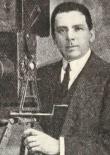Film cameraman, director,
Franklyn Barrett started out his professional career as a musician, playing violin at various English theatres and touring the provinces with theatre companies during the 1890s. He moved to New Zealand around 1895, possibly joining his father and brother in Wellington. While touring with various companies he began experimenting photography and moving pictures. He began making documentary-style shorts in both New Zealand and Australia, and Australia and New Zealand, including the 1901 Royal visit by the Duke and Duchess of York and in 1904 became the first person to film the complete running of the Melbourne Cup.
Barrett's professional film career began in 1908 when he secured a position as newsreel cameraman with Pathe-Frere in Melbourne. Among his early works were The Sea Coasts of New Zealand and South Sea Island Films (ca. 1909-1910). When West's Pictures took over Pathé in 1911, he remained a cameraman but was soon supervising the production feature films. He joined the Fraser Film Release and Photographic Company in 1913, and over the next few years established his reputation as a director. Among his early films were The Pioneers (1916), Australia's Peril (1917), The Monk and the Woman (1918), The Lure of the Bush (1918) and The Breaking of the Drought (1920). He also directed Maggie Moore in an adaptation of Struck Oil in 1919, although this film was poorly received by critics and the public alike.
In 1920 Barrett formed his own film company with solicitor Barry Kenwood, and over the next three years produced three features - A Girl of the Bush, Know thy Child and A Rough Passage. By mid-1922 the company found it impossible to compete with the American film combines and folded. Barrett subsequently became manager of the Capitol Theatre, Canberra in 1925 and two years later joined Hoyts' Theatres Ltd, managing its cinemas at Neutral Bay, Mosman, Arncliffe, Clovelly and Woollahra.
Franklyn Barrett died in Sydney aged 91. He was survived by his married daughter Harrie Marrett (known professionally as 'Toddy' Barrett).
[Sources: Andrew Pike and Ross Cooper Australian Film, 1900-1977 : A Guide to Feature Film Production 1980 (1980); and Martha Rutledge "Barrett, Walter Franklyn (1873-1964)" Australian Dictionary of Biography (1990)]
 4717413946288057104.jpg
4717413946288057104.jpg
 4717413946288057104.jpg
4717413946288057104.jpg